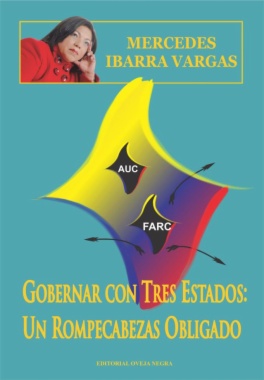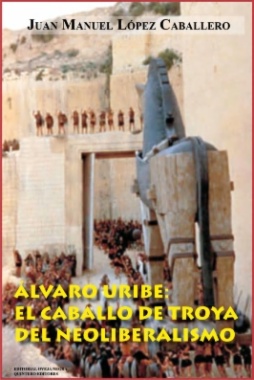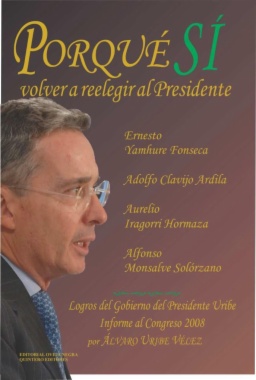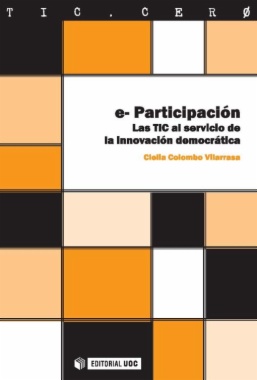
Estás filtrando por
Se encontraron 1869 resultados en recursos

Compartir este contenido
Gobernar con tres Estados un rompecabezas obligado
Copia el enlace o compártelo en redes sociales

Alvaro Uribe: el caballo de Troya del neoliberalismo
Compartir este contenido
Alvaro Uribe: el caballo de Troya del neoliberalismo
Copia el enlace o compártelo en redes sociales

Porqué sí volver a reelegir al Presidente
Compartir este contenido
Porqué sí volver a reelegir al Presidente
Copia el enlace o compártelo en redes sociales

e-Participación
Compartir este contenido
e-Participación
Copia el enlace o compártelo en redes sociales
Mensaje presidencial - Ejemplar 1
Compartir este contenido
Mensaje presidencial - Ejemplar 1
Copia el enlace o compártelo en redes sociales
![Imagen de apoyo de Carta pastoral del Illmo. Sr. Obispo de Popayán en que se refutan los errores anti-católicos del proyecto de ley presentado y admitido en el Senado determinando los derechos y deberes del gobierno de Venezuela con respecto al culto: a la que se agrega la Encíclica de nuestro samo. Padre Gregorio XVI dirijida a todos los obispos del orbe cristiano, con motivo de su exaltacion a la silla de San Pedro [recurso electrónico] / [Salvador, Obispo de Popayan]](/static/biblored/img/resource/type-book.d5ecb98a8a0e.svg)
Carta pastoral del Illmo. Sr. Obispo de Popayán en que se refutan los errores anti-católicos del proyecto de ley presentado y admitido en el Senado determinando los derechos y deberes del gobierno de Venezuela con respecto al culto: a la que se agrega la Encíclica de nuestro samo. Padre Gregorio XVI dirijida a todos los obispos del orbe cristiano, con motivo de su exaltacion a la silla de San Pedro [recurso electrónico] / [Salvador, Obispo de Popayan]
Compartir este contenido
Carta pastoral del Illmo. Sr. Obispo de Popayán en que se refutan los errores anti-católicos del proyecto de ley presentado y admitido en el Senado determinando los derechos y deberes del gobierno de Venezuela con respecto al culto: a la que se agrega la Encíclica de nuestro samo. Padre Gregorio XVI dirijida a todos los obispos del orbe cristiano, con motivo de su exaltacion a la silla de San Pedro [recurso electrónico] / [Salvador, Obispo de Popayan]
Copia el enlace o compártelo en redes sociales
![Imagen de apoyo de Nos Bonifacio A. Toscano, vicario general de la Arquidiócesis de Bogotá, por ausencia del ilustrísimo señor Arzobispo doctor Antonio Herrán [recurso electrónico]](/static/biblored/img/resource/type-book.d5ecb98a8a0e.svg)
Nos Bonifacio A. Toscano, vicario general de la Arquidiócesis de Bogotá, por ausencia del ilustrísimo señor Arzobispo doctor Antonio Herrán [recurso electrónico]
Compartir este contenido
Nos Bonifacio A. Toscano, vicario general de la Arquidiócesis de Bogotá, por ausencia del ilustrísimo señor Arzobispo doctor Antonio Herrán [recurso electrónico]
Copia el enlace o compártelo en redes sociales
![Imagen de apoyo de Nos Antonio María Amézquita vicario general del arzobispado, por ausencia del ilustrísimo señor arzobispo doctor Antonio Herran [recurso electrónico]](/static/biblored/img/resource/type-book.d5ecb98a8a0e.svg)
Nos Antonio María Amézquita vicario general del arzobispado, por ausencia del ilustrísimo señor arzobispo doctor Antonio Herran [recurso electrónico]
Compartir este contenido
Nos Antonio María Amézquita vicario general del arzobispado, por ausencia del ilustrísimo señor arzobispo doctor Antonio Herran [recurso electrónico]
Copia el enlace o compártelo en redes sociales
![Imagen de apoyo de Arquidiócesis de Santafé de Bogotá, 9 de stbre. de 1863 [recurso electrónico] / Miguel Arias](/static/biblored/img/resource/type-book.d5ecb98a8a0e.svg)
Arquidiócesis de Santafé de Bogotá, 9 de stbre. de 1863 [recurso electrónico] / Miguel Arias
Compartir este contenido
Arquidiócesis de Santafé de Bogotá, 9 de stbre. de 1863 [recurso electrónico] / Miguel Arias
Copia el enlace o compártelo en redes sociales
![Imagen de apoyo de Representación que los Prelados Regulares de esta capital han elevado a la Cámara del Senado, reclamando sus derechos [recurso electrónico] / [Frai José María Ruiz ... [et al.]]](/static/biblored/img/resource/type-book.d5ecb98a8a0e.svg)
Representación que los Prelados Regulares de esta capital han elevado a la Cámara del Senado, reclamando sus derechos [recurso electrónico] / [Frai José María Ruiz ... [et al.]]
Compartir este contenido
Representación que los Prelados Regulares de esta capital han elevado a la Cámara del Senado, reclamando sus derechos [recurso electrónico] / [Frai José María Ruiz ... [et al.]]
Copia el enlace o compártelo en redes sociales
Selecciona las Colecciones en las que vas a añadir el contenido
Para consultar los contenidos añadidos busca la opción Tus colecciones en el menú principal o en Mi perfil.
